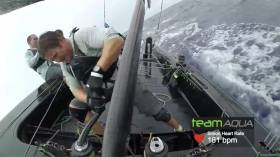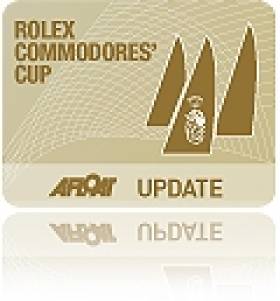Displaying items by tag: Simon Johnson
Irish Crews Second and Third at 44Cup in Spain
Irish crews were second and third overall in the 44Cup Alcaidesa Marina in Spain at the weekend.
Just two points separated the top four boats, and with nine points on the table, mathematically, any of the top six could still win.
Donaghdee's Oisin McClelland and Dublin Bay's Cian Guilfoyle were on board Aleph Racing, and Wicklow's Simon Johnson was on the Black Star Racing Team, finishing second and third, respectively.
"First podium for this boat. Eight events in the making. First bullet this event, too", Johnson told Afloat after the much improved Black Star performance.
 Ireland's Oisin McClelland and Cian Guilfoyle and the Aleph Racing crew with their second overall prize at the 44 Cup in Spain Photo: Nico Martinez
Ireland's Oisin McClelland and Cian Guilfoyle and the Aleph Racing crew with their second overall prize at the 44 Cup in Spain Photo: Nico Martinez
Racing started in moderate wind and rain beneath an ominously dark sky before building to 20+ knots in the gusts for the third and final race.
 Wicklow's Simon Johnson was on the third places Black Star Racing Team at the 44 Cup in Spain Photo: Nico Martinez
Wicklow's Simon Johnson was on the third places Black Star Racing Team at the 44 Cup in Spain Photo: Nico Martinez
Leading by one point going into this race, life was made easy for owner Igor Lah, tactician Adrian Stead and the crew of Team Ceeref powered by Hrastnik 1860 as their most threatening rivals tied themselves up.
Ceeref won the pin, claimed the left and, returning on port, screeched into the starboard layline and, from there, rounded the top mark just ahead of Team Nika and Chris Bake's Team Aqua. At this point, their top four rivals were not featuring: leader going into the final day and generous host of the 44Cup Alcaidesa Marina, John Bassadone and his Peninsula Racing and star of the first two days – Christian Zuerrer's Black Star Sailing Team – were eighth and ninth respectively both having committed to the unfavored right.
The closest of Ceeref's rivals was Aleph Racing in sixth.
44Cup Alcaidesa Marina Results: (After nine races)
1. Team Ceeref powered by Hrastnik 1860, 34
2. Aleph Racing, 38
3. Black Star Sailing Team, 41
4. Peninsula Racing, 41
5. Team Aqua, 42
6. Charisma, 46
7. Team Nika, 47
8. Artemis Racing, 48
9. Noticia, 69
44Cup Overall Results:
(After four events, with one discard)
1. Charisma - 2 1 1 6 - 4
2. Team Ceeref powered by Hrastnik 1860 - 1 5 5 1 - 7
3. Aleph Racing - 3 3 4 2. - 8
4. Peninsula Racing - 4 2 6 4 - 10
5. Team Nika - 5 4 3 7 - 12
6. Team Aqua - 7 7 2 5 - 14
7. Black Star Sailing Team - 8 6 7 3 - 16
8. Artemis Racing - 6 8 8 8 - 22
Ireland's Simon Johnson is in the pit of Switzerland’s Black Star Sailing Team when the crew joins the 44Cup for the second event of the 2022 season in Cascais, Portugal, over 11-15 May.
As regular Afloat readers will recall, the former crew on Anthony O’Leary’s Ker 39 Antix showed he was in peak physical condition in his then new role with the British-owned RC44 Championship Tour mainstay, Aqua back in 2017 here
Led by passionate amateur sailor Christian Zuerrer, Black Star Sailing Team will be running their 44Cup programme alongside their successful GC32 Racing Tour campaign, in which they finished third overall in 2021. In Cascais, the team will be racing on the class’s own RC44, which is available for potential owners to try, before their new boat, which only came out of the factory last week, is ready to race.
 RC44 Racing
RC44 Racing
Some old and new faces will join Black Star Sailing’s crew. RC44 veteran, New Zealand’s Cameron Dunn, will be calling tactics and guiding the new team through the challenges of racing their lively, high performance yacht against the fleet of eight other RC44 one designs and their highly experienced, competitive crews. Dunn brings with him onto the team fellow Kiwi, Emirates Team New Zealand grinder Guy Endean and experienced RC44 pitman Simon Johnson, from Ireland.
Transferring over from Black Star Sailing’s GC32 crew will be mainsail trimmer Flavio Marazzi, trimmer Will Alloway and Swiss sailors, offside trimmer Grégoire Siegwart and bowman Nick Zeltner.
Founded in 2019, Black Star Sailing Team initially set out as a campaign to promote amateur sailors. Owner/driver Christian Zuerrer explains: "The 44Cup's pro/am rule, the simplicity of the one-design boat and the highly professional racing circuit allows me to achieve my goal of providing a pathway for young sailors into the world of professional racing. It is the perfect platform to understand what goes into an international regatta of this level".
Despite having two teams unable to compete due to the World Sailing sanctions, the 44Cup still has at least eight regular teams confirmed as being on the start line at each of its five events this season, plus there is a ninth, the RC44 class boat, booked out for potential owners to get a taste of RC44 racing.
One of the few professional sailing classes that maintained its full schedule of racing in 2021; plus the continued devotion to the class of it enthusiastic owners’ group and considerable interest from new teams wanting to join the 44Cup, on top of a fleet of at least nine boats – the 44Cup is bucking the trend and enjoying a period of growth, despite these troubled times.
BLACK STAR SAILING TEAM CREW LIST:
- Christian Zuerrer (SUI) - Helm
- Cameron Dunn (NZL) - Tactician
- Flavio Marazzi (SUI) - Main
- William Alloway (GBR) - Trimmer
- Grégoire Siegwart (SUI) - Offside trim
- Guy Endean (NZL) - Grinder
- Simon Johnson (IRL) - Pit
- Nick Zeltner (SUI) - Bow
Simon Johnson Racing Full-Hearted With RC44 Team Aqua
#Offshore - New footage from Team Aqua’s RC44 shows their Irish pitman Simon Johnson in the heart of the action.
And the video takes that literally — as it tracks his heart rate topping out at 181bpm after a leeward drop, a left-hand turn and an early tack.
The former crew on Anthony O’Leary’s Ker 39 Antix is clearly in peak physical condition in his new role with the British-owned RC44 Championship Tour mainstay.
Commodores Cup: Send YOUR Good Luck Wishes HERE!
MANY OF YOU SENT GOOD LUCK WISHES AND NOW YOU CAN SAY WELL DONE TOO! SCROLL DOWN THE PAGE TO LEAVE YOUR CONGRATULATION MESSAGE!
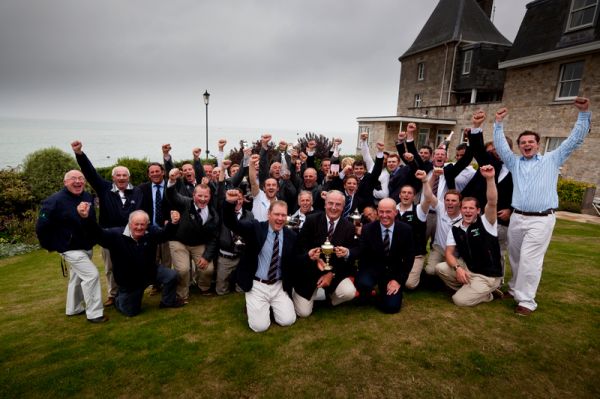
The ICRA Team Celebrations in Cowes, Photo: David Branigan
After a series of near misses in the Commodores Cup, there are many reasons why 2010 was an entirely appropriate timing for an Irish win in Cowes today.
Ireland's single three boat team (below) faced stiff opposition in the final ten team line up. Individual performances this season though, including a win at the British IRC Nationals, is proof, were it needed, that Ireland still was always on course to win the Commodores Cup.
Ireland's team on the Solent was Royal Cork based; Antix, Anthony O'Leary (Ker 39); Marinerscove.ie David Dwyer (Mills 39) and Roxy 6 Robert Davies (Corby 36). The full crew list for each boat is below, representing the very best of Irish sailing talent.
Third time lucky is how it was scripted in 08, but not how it was acted out. After first being jilted by the French and now, for the second time, by the English, the Irish could be forgiven for giving up on the cup but we never did. This victory represents the final week of eight months preparation for superb assault on the title.
PLEASE SCROLL DOWN TO THE END OF THE PAGE AND LEAVE YOUR CONGRATULATIONS MESSAGE!

Team Ireland 2010 Commodores Cup
Photos by Robert Bateman
IRL3939 Antix Anthony O'Leary (Ker 39)
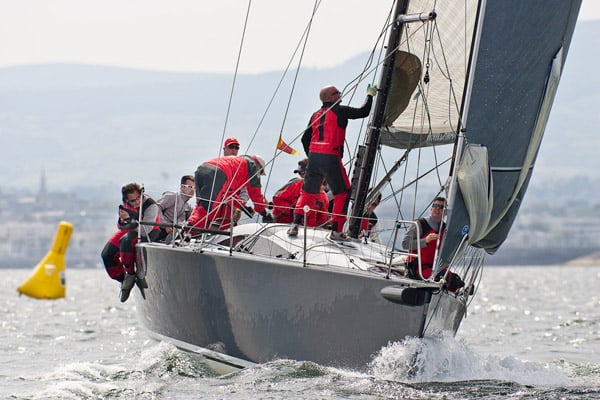
Anthony O'Leary (IRL)
David Lenz (GBR)
Peter O'Leary (IRL)
Ross Deasy (IRL)
Brian Lennon (IRL)
Stephen O'Sullivan (IRL)
Eoin Leahy (IRL)
Frederick Cudmore (IRL)
Simon Johnson (IRL)
Rory O'Sullivan (IRL)
Jimmy Houston (GBR)
Derek Moynan (IRL)
Tom Durcan (IRL)
Robert O'Leary (IRL)
Darragh O'Connor (IRL)
IRL39000 Marinerscove.ie David Dwyer (Mills 39)
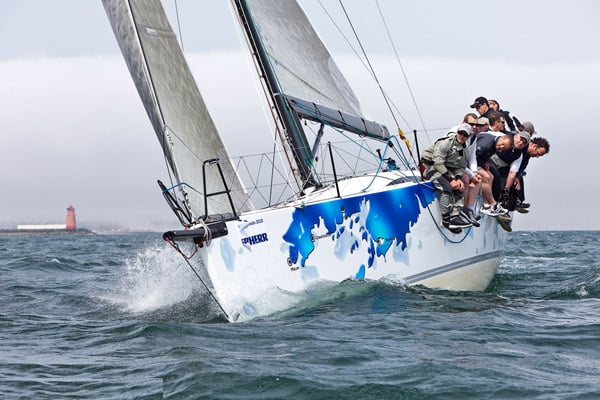
Andy Beadsworth (GBR)
David Bolton (IRL)
Padraig Byrne (IRL)
Alan Curran (IRL)
David Dwyer (IRL)
Bernard Fitzpatrick (IRL)
Brian Heneghan (IRL)
David Love (IRL)
Tom Murphy (IRL)
Nicholas O'Leary (IRL)
Clive O'Shea (IRL)
Sandy Rimmington (IRL)
Chris Schirmer (GBR)
Don Wilson (IRL)
IRL36000 Roxy 6 Robert Davies (Corby 36)
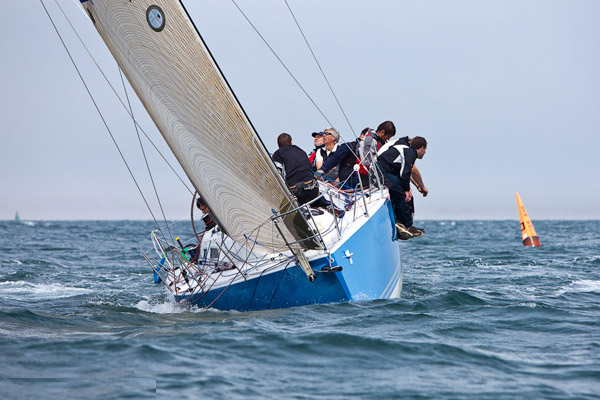
Rob Davies (GBR)
Andrew Creighton (IRL)
Marty O'Leary (IRL)
Jim Hughes (IRL)
Paul Farries (GBR)
Nelson Moore (IRL)
Tom Whitburn (GBR)
Michael Liddy (IRL)
Aidan O'Connell (IRL)
Maurice O'Connell (IRL)
Team Management:
Barry Rose, Fintan Cairns, Denis Kiely, Mike Broughton and Norbert Reilly
- RORC
- Anthony O'Leary
- Norbert Reilly
- ICRA
- Eoin Leahy
- Maurice O'Connell
- Commodores Cup
- Fintan Cairns
- Peter O'Leary
- antix
- Mike Broughton
- roxy 6
- Mariners Cove
- David Lenz
- Ross Deasy
- Brian Lennon
- Stephen O'Sullivan
- Frederick Cudmore
- Simon Johnson
- Rory O'Sullivan
- Jimmy Houston
- Derek Moynan
- Tom Durcan
- Robert O'Leary
- Darragh O'Connor
- Andy Beadsworth
- David Bolton
- Padraig Byrne
- Alan Curran
- David Dwyer
- Bernard Fitzpatrick
- Brian Heneghan
- David Love
- Tom Murphy
- Nicholas O'Leary
- Clive O'Shea
- Sandy Rimmington
- Chris Schirmer
- Don Wilson
- Rob Davies
- Andrew Creighton
- Marty O'Leary
- Jim Hughes
- Paul Farries
- Nelson Moore
- Tom Whitburn
- Michael Liddy
- Aidan O'Connell
- Barry Rose
- Denis Kiely


























